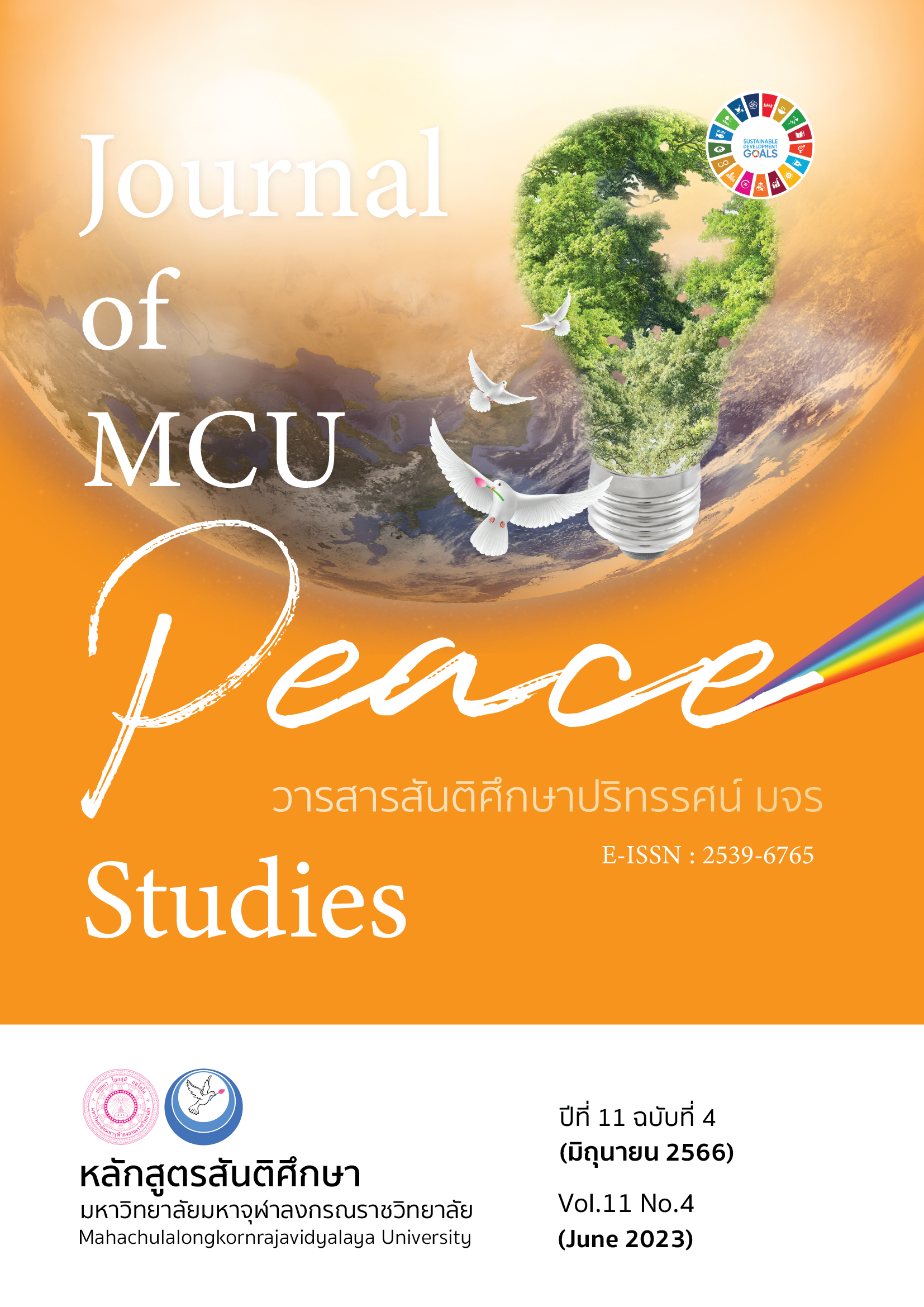การพัฒนาโปรแกรมฝึกอบรมเพื่อเสริมสร้างการสร้างสรรค์และนวัตกรรม สำหรับนักศึกษามหาวิทยาลัยราชภัฏ
Main Article Content
บทคัดย่อ
บทความวิจัยนี้มีวัตถุประสงค์ 1) เพื่อพัฒนาโปรแกรมฝึกอบรมเพื่อเสริมสร้างการสร้างสรรค์และนวัตกรรมสำหรับนักศึกษามหาวิทยาลัยราชภัฏ 2) เพื่อศึกษาผลการใช้โปรแกรมฝึกอบรมเพื่อเสริมสร้างการสร้างสรรค์และนวัตกรรมสำหรับนักศึกษามหาวิทยาลัยราชภัฏ เป็นการวิจัยเชิงพัฒนา ผู้เชี่ยวชาญตรวจสอบความเหมาะสมของโปรแกรม จำนวน 5 คน และนักศึกษาผู้เข้าอบรม จำนวน 30 คน เครื่องมือที่ใช้ ได้แก่ โปรแกรมฝึกอบรม และแบบวัดการสร้างสรรค์และนวัตกรรมสำหรับนักศึกษามหาวิทยาลัยราชภัฏ วิเคราะห์ผลการวิจัยด้วยสถิติ ได้แก่ ร้อยละ ค่าเฉลี่ย ส่วนเบี่ยงเบนมาตรฐาน และการวิเคราะห์ความแปรปรวนพหุคูณทางเดียวนำเสนอผลการวิจัยเชิงสถิติ
ผลการวิจัยพบว่า 1) โปรแกรมฝึกอบรมเพื่อเสริมสร้างการสร้างสรรค์และนวัตกรรม มีจำนวน 14 กิจกรรม ใช้หลักการทฤษฎีทางจิตวิทยาการเรียนรู้กลุ่มปัญญานิยม ได้แก่ การสร้างองค์ความรู้ด้วยตนเอง การสร้างองค์ความรู้ด้วยตนเองจากชิ้นงาน การเรียนรู้แบบกำกับตนเอง การสร้างองค์ความรู้ด้วยตนเอง เชิงสังคม การรู้คิดของตนเอง การจัดการเรียนรู้แบบร่วมมือ และการเรียนรู้โดยใช้ปัญหาเป็นฐาน โดยใช้รูปแบบกิจกรรมที่ใช้ความคิดและกิจกรรมกลุ่มระดมสมอง โปรแกรมมีความเหมาะสมในระดับมากที่สุด 2) หลังการใช้โปรแกรมฝึกอบรมที่พัฒนาขึ้นทำให้นักศึกษามหาวิทยาลัยราชภัฏมีคุณลักษณะของการสร้างสรรค์และนวัตกรรมสูงขึ้นใน 4 ด้าน ได้แก่ ปัญญาสร้างสรรค์ จิตใจเชิงสร้างสรรค์ ปฏิสัมพันธ์ทางสังคมและการสร้างนวัตกรรม สูงขึ้นกว่าก่อนใช้โปรแกรมอย่างมีนัยสำคัญทางสถิติที่ระดับ .01 ซึ่งจากผลการวิจัยนี้สามารถนำโปรแกรมและแบบวัดไปใช้พัฒนาผู้เรียน หรือเพื่อเป็นแนวทางสำหรับประยุกต์ใช้ในการพัฒนาผู้เรียนในระดับอุดมศึกษาและระดับอื่นๆ ในการพัฒนาการสร้างสรรค์และนวัตกรรมได้
Article Details

อนุญาตภายใต้เงื่อนไข Creative Commons Attribution-NonCommercial-NoDerivatives 4.0 International License.
ทัศนะและความคิดเห็นที่ปรากฏในบทความในวารสาร ถือเป็นความรับผิดชอบของผู้เขียนบทความนั้น และไม่ถือเป็นทัศนะและความรับผิดชอบของกองบรรณาธิการ ยินยอมว่าบทความเป็นลิขสิทธิ์ของวารสาร
เอกสารอ้างอิง
Amabile, T.M. (1988). A Model of Creativity and Innovation in Organizations. Research in Organizational Behavior, 10(1), 123-167.
Chantago, J. (2019). Teaching in 21st Century. Khon Kaen: Mahamakut Buddhist University Isan Campus.
Chinnawong, W. (2019). Integrated Learning and Teaching. Academic Journal, 4(10), 147-160.
Chittrakorn, A. (2017). A Development of Collaborative Blended Learning Using Future Problem Solving Techniques to Promote Creativity in Graphic Design on Instructional Media of Pre-Service Teacher Students, Silpakorn University. Silpakorn University Journal, 37(1), 49-65.
Educational Quality Assurance Center King Mongkut’s University of Technology North Bangkok. (2014). 21st Century Learning Skills. The Journal of King Mongkut's University of Technology North Bangkok, 303(1), 111-124.
Johnson, M. W. (2010). The Time Has Come for Business Model Innovation. Leader to Leader, 2010(57), 6–10.
Kityanyoung, S. (2002). Techniques for Being Training Lecturers. (2nd ed.). Bangkok: Multiinformation Technology.
Ministry of Higher Education, Science, Research and Innovation. (2021). University Student Data Divided by Educational Level and Gender. Ministry of Higher Education, Science, Research and Innovation. Retrieved August 24, 2021, from https://data.go.th/dataset/univstd1101
Montiraj, K., Hongsiriwat, A., & Polsaram, P. (2018). Development of Training Program Using Constructionism Theory to Develop Critical, Creative, Productive, and Responsible Mind (CCPR) of Higher Education Students in Communication Arts in Private Higher Education Institutions. Dusit Thani College Journal, 12(2), 209-222.
Morrison, M. (2010). Creativity and Innovation Models - Applying in Practice. Retrieved October 6, 2018, from https://rapidbi.com/creativity-and-innovation-models-applying-in-practice/
Panit, W. (2013). Teachers for Learners to Build Flipped Classroom. Retrieved September 28, 2018, from www.scbfoundation.com
Partnership for 21st Century. (2007). Learning and Innovation Skills-4Cs Key Subjects-3Rs and 21st Century Themes Critical Thinking Communication Collaboration Creativity Framework for 21st Century Learning 21st Century Student Outcomes and Support Systems Framework for 21st Century. Retrieved August 24, 2020, from www.P21.org
Power, J. B. (2016). An Investigation into the Factors Affecting Student Creativity in Higher Education in Thailand. Thammasat Review, 18(1), 177–198.
Sariwat, L. (2014). Psychology for Teachers. Bangkok: O. S. Printing House.
Sattrapruek, S. (2017). Flipped Classroom in 21st Century Learning for Development of Learning and Innovation Skills. Academic Service Journal, Prince of Songkhla University, 28(1), 100-108.
Somabut, A. (2013). Constructivist Theory. Retrieved August 24, 2021, from https://teacherweekly.wordpress.com/
Wongyai, W., & Patphol, M. (2014). Coaching for Thinking. (3rdedition). Bangkok: Charansanitwong Printing.


